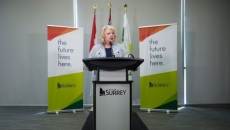As the mercury rises across the country, inflation has reportedly cooled, leading many Canadians to hope that better financial days lie ahead. Those days, however, are not yet here.
New data from the non-profit Angus Reid Institute finds one-in-three Canadians (32%) continuing to fall into the “Struggling” on the ARI Economic Stress Index, which measures how well Canadians are keeping up on core economic indicators, alongside their own economic outlook. There is now a nine-point gap between this group and the next closest. Two years ago, the Struggling were one-quarter of the population. Falling are the number of “Comfortable”, a group that is now 23 per cent of the population, compared to 29 per cent in 2022.
One key driver of this trend are housing costs. More than two-in-five Canadians (44%) say they are having a tough or very difficult time keeping up with this aspect of their finances. Among homeowners with a mortgage this rises to 47 per cent, and among renters, to 56 per cent.
While inflation has stabilized in recent months, prices remain high according to what Canadians are encountering in their daily life. Asked about their perceptions of prices for a basket of goods similar to those that comprise to Consumer Price Index, there are almost no products where Canadians are seeing relief. Nearly nine-in-ten say produce (87%) and meat products (87%) have still risen in price in recent months, while three-quarters or more say this of gasoline (76%) and dairy (80%).
Against this backdrop, pessimism remains prominent for what the next 12 months hold. While one-in-five (18%) say they expect to be in a better financial situation next year, near twice as many (34%) say they expect to be worse off. The largest group (39%) say they expect more of the same.
More Key Findings:
The top issues Canadians see facing the country are unchanged from last summer, with the cost of living, health care, and housing affordability taking the top three positions respectively. Concern over immigration has doubled as a high priority choice, from eight to 18 per cent.
Politically, a challenging economic climate has evidently galvanized many Canadians around the opposition Conservatives. The Struggling make up 44 per cent of those who would support the CPC currently, compared to 19 per cent of Liberal voters and 25 per cent of NDP voters






